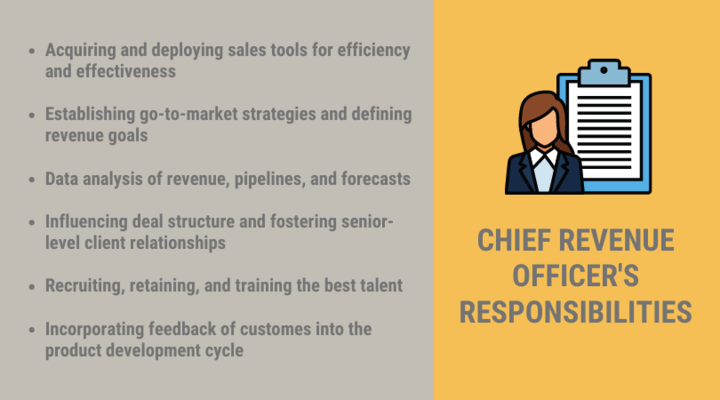The CRO position has been around for a while, but its popularity is exploding because Forbes called the CRO “CEOs secret weapon” back in 2009.
The number of CRO jobs has increased significantly. Is it a miracle position that can help propel remuneration to new pinnacles?
Let’s dig in.
Industry analysts predict that almost 25% of companies will have a chief revenue officer by 2023. Click To Tweet
What with the prediction by 2023? Businesses have realized that they can put together marketing, customer success, and sales into one seamless revenue machine.
Michael Maoz, Salesforce’s senior VP of innovation strategy, said that there had been an emphasis on the chief revenue officer in recent years. They can identify strategic ways for organizations to move into successful futures.
What is of Chief Revenue Officer?
A chief revenue officer (CRO) is responsible for the remuneration-generating systems of a company.
They oversee how departments drive revenue for the entire organization. Those departments may include marketing, sales, finance, and customer success.
A CRO creates a comprehensive view of customers’ life cycles, from generating new leads to getting deals.
“Growth” has a distinct definition compared to how it was defined ten years ago. It is no longer just about a company’s financial valuation.

It is a more general term that includes market share, growing talent, and brand relevance. A company’s CRO role considers this holistic meaning of growth.
One of the essential job functions for a company is to bring in revenue. This role often falls on an individual who takes care of everything from marketing and sales through customer service and beyond.
To achieve the best possible results, CROs need a complete understanding of their business. This means tearing down any silos that might prevent them from seeing every single part of it at once.
They have a plan to grow their business and maximize profits. However, the CRO must not be mistaken for the VP of Sales.
Timothy O’Neil, the chief revenue officer at Alation, states that there is a perception of CROs as being some salesperson extraordinaire. As someone who has taken on this role for an expanding company, he stresses that a CRO focuses more on methodologies and strategies than daily deals.
A chief revenue officer has many responsibilities. Although their tasks may change (depending on the company), they might include the following:
- Acquiring and deploying sales tools for efficiency and effectiveness
- Establishing market strategies and defining revenue metrics
- Data analysis of forecasts, revenue, and pipelines
- Influencing deal structure and promoting senior-level customer relationships
- Recruiting, retaining, and training the best talent
- Incorporating feedback of customers into the outcome development process

Companies with one person responsible for alignment among all departments involved in revenue generation (sales and marketing) experience more success. Forrester found that companies with aligned technology, people, and processes had 36% higher growth in sales revenues and up to 28% increase in profitability.
The CRO has a long-term perspective and is thinking about maintaining revenue in the future. They want to ensure that enough money will come in even after the quarter ends.
“The CRO is thinking way ahead. They’re thinking about renewals and how to ensure that revenue continues to exist and persist beyond this quarter. There’s a wider lens around bringing the voice of the customer into all parts of the organization,”
Said Adnan Chaudhry, head of Americas sales at Slack.
Why are CROs Overflowing in Popularity?
Answer: 2020 happened.
The pandemic has shown that organizations need to adapt quickly and make decisions for the long term. It is no longer enough just having sales, marketing, or customer success departments; they must work together. This will help ensure survival, mainly because of the challenges brought upon by the pandemic.
Asia Corbett, RevGenuis’ head of community and revenue operations, a network for revenue professionals, said they are starting to think about the sales continuum. It would help if you had someone who understands strategy.
“We’re seeing this CRO role now because we’re starting to think about revenue as more of a continuum rather than just sales bringing in revenue,”
Corbett said.
It’s reassuring when you’re given the CRO title because no other person is coming into that role and taking your place. It lets people know they are at the highest level.
The higher title is a fantastic way to compel talent in an escalating battle for top sellers.
Will a CRO Substitute the Head of Sales?
CROs are not coming for sales managers’ jobs but instead will have a job that may change how we think about leadership.
A chief revenue officer drives the overall revenue generation strategy; as Corbett pointed out, if we see the CRO responsible for all market activities, senior marketing, customer success, and sales should report to them.
For example, some in charge of sales are incentivized with quarterly sprints. On the other hand, a chief revenue officer does not just focus on short-term gains. When quick wins do not sidetrack you, the CRO enables you to keep a marathon perspective.
The head of sales has to make sure they are on target for the quarter. But companies have to consider three, five, ten years, or a generation. That’s why they bring in a CRO. This person is liberated from short-termism. Instead, they focus on the big picture.

Another difference between the two positions is their perspective on recurring revenue. A CRO focuses on renewal and retention rather than closing new deals.
Simply put, the chief of sales wins games, while a CRO builds a championship legacy.
Final Thoughts on Chief Revenue Officers
Preparing ahead of time is not just for athletes. A chief revenue officer can be seen as a “chief readiness” officer.
The CRO is the one who makes sure that everything will go smoothly at scale by making all sales employees work together for success. Click To Tweet
The chief revenue officer aims to provide a seamless customer journey and a solid, predictable future for sales organizations by playing the long game.
Want to help contribute to future articles? Have data-backed and tactical advice to share? I’d love to hear from you!
We have over 60,000 monthly readers that would love to see it! Contact us and let's discuss your ideas!
